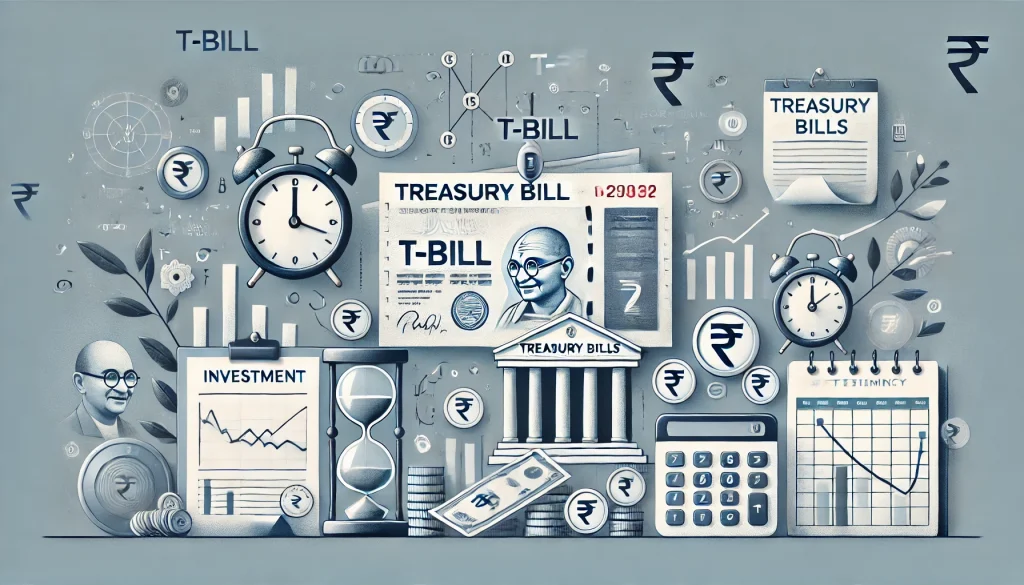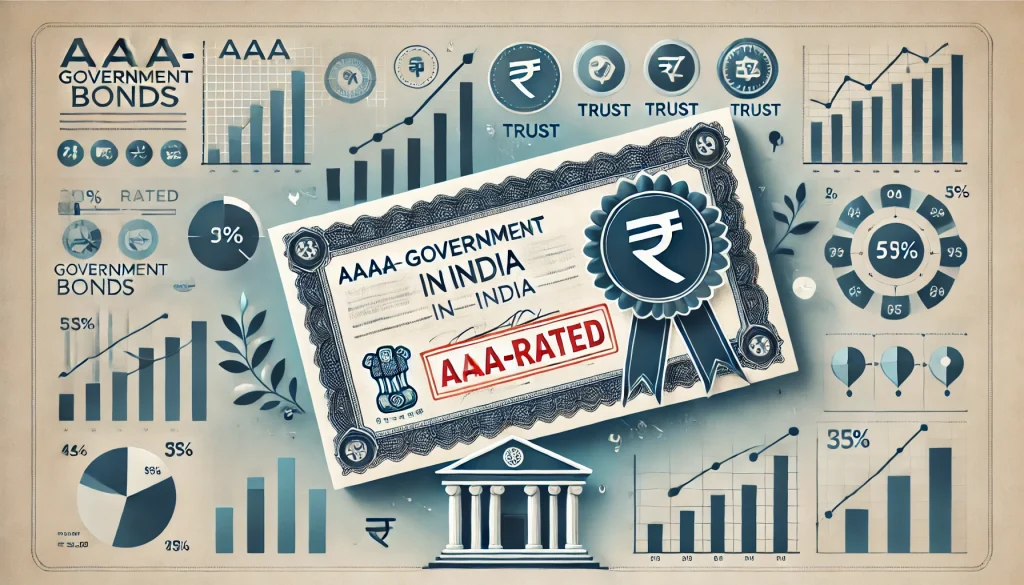
When the Indian government requires financial support to meet various obligations, it seeks funding from the general public. Treasury bills are one of the dependable debt instruments used for this purpose. It is a promissory note that assures repayment in the future. To learn more about what a treasury bill is and other crucial details, go through this blog.
What Are Treasury Bills?
A Treasury bill (T-Bill) is a short-term financial instrument introduced by the Indian government and managed by the Reserve Bank of India (RBI). RBI auction treasury bills which you can buy through non-competitive or competitive bidding.
Treasury bills are zero-coupon securities which do not offer periodic interest payments. Instead, T-Bills are sold at a discounted price and the profit lies in the difference between the discounted purchase price and the face value received at maturity.
How Treasury Bills Work?
Let us understand the workings of treasury bills with an example. Suppose you decided to buy an 182-day treasury bill with a face value of ₹145 and bought it at a discounted price of ₹120. After 182 days, the government will buy back the bill at its face value of ₹145, resulting in a profit of ₹25 for you. Nevertheless, it is important to understand that T-bills are zero-coupon instruments, meaning you do not earn any interest income from them.
Who Should Consider Investing in Treasury Bills?
Treasury bills in India are ideal for individuals looking for a secure investment option that offers reasonable returns. The RBI facilitates the process by allowing investors to participate through non-competitive bidding, making it accessible even for those with limited experience.
Information about the discount price and face value is shared in advance, ensuring complete transparency throughout the investment process. This allows you to make informed decisions while creating opportunities for wealth accumulation.
T-bills are suitable for all types of investors, regardless of their financial knowledge or risk appetite. Additionally, they can be a reliable choice for diversifying your portfolio. Institutions such as banks, companies, trusts, insurance firms, state governments, provident funds and other financial organisations can also benefit from investing in treasury bills.
What Are the Different Ways to Buy Treasury Bills in India?
You can buy treasury bills in India through either of the following ways:
Via RBI
You can purchase treasury bills directly through the Reserve Bank of India (RBI). To do this, you will need to open an RDG (Retail Direct Gilt) account with the RBI. This account can be linked to your savings account for seamless transactions. Purchases are made during auctions conducted by the central bank at regular intervals.
Via Stock Exchange
Treasury bills can be purchased from the stock exchange, either in the primary or secondary market. To do so, you will need a demat account, which can be opened through a broker or bank. Once your demat account is active, you can initiate transactions and start investing in T-bills.
What Are the Types of Treasury Bills?
In India, 4 types of treasury bills are issued through auctions, categorised based on their maturity periods. Here is a breakdown of each:
14-Day Treasury Bills
These bills mature within 14 days from the issuance date. The auction is conducted every Wednesday, with payment due on the following Friday. Investors can purchase these bills in multiples of ₹1 lakh, with ₹1 lakh being the minimum investment requirement.
91-Day Treasury Bills
These treasury bills have a maturity period of 91 days from the date of issue. The auctions are held weekly on Wednesdays, and payments are made by the following Friday. The bills are available in denominations of ₹25,000, which is also the minimum investment amount.
182-Day Treasury Bills
Maturing in 182 days from the issue date, these bills are auctioned every alternate Wednesday, with payments scheduled for the following Friday. Investors must purchase them in multiples of ₹25,000, with a minimum investment of ₹25,000.
364-Day Treasury Bills
With a maturity period of 364 days, these bills are also auctioned every alternate Wednesday. Payments are made on the Friday following the auction. Like the 182-day bills, they are sold in multiples of ₹25,000, with ₹25,000 as the minimum investment.
What Are the Advantages of Treasury Bills?
The following are some crucial benefits of treasury bills:
Risk-Free Investment
Treasury bills, issued by the RBI and backed by the Indian government, are among the safest short-term investment options in India. These securities are considered liabilities of the government, ensuring repayment by a fixed date. This backing by the country’s highest authority guarantees the safety of your investment, even during times of economic uncertainty.
High Liquidity
If you are seeking a secure way to earn short-term returns, treasury bills can be a great choice. Additionally, you can resell these securities in the secondary market, making it easy to convert your investment into cash during urgent financial needs.
Easy Access Through Non-Competitive Bidding
The RBI conducts weekly auctions for treasury bills, allowing retail investors like you to participate without quoting a specific yield or price. This non-competitive bidding system simplifies the process for small-scale and first-time investors, giving you an easy entry point into the government securities market while promoting greater liquidity in the capital market.
What Are the Disadvantages of the Treasury Bill?
Here are some drawbacks of treasury bills that you may encounter:
Low Returns
These debt instruments provide lower returns in comparison to other investment options.
Taxation
Returns from treasury bills are treated as short-term capital gain and subject to taxation according to your income slab rate.
Inflation Impact
Market fluctuations affect the price of a T-Bill. Its predetermined return might not adequately offset the decrease in purchasing power over time caused by inflation.
What Are the Different Factors that Influence the Price of Treasury Bill?
Several factors impact the pricing and returns of Treasury bills, including:
Market Risk
Market risk arises from fluctuations in the prices of government securities due to changes in interest rates, potentially leading to valuation losses. While Treasury bills do not pay regular interest, they provide assured returns because they are issued at a discount and redeemed at face value, minimising the impact of market risk.
Government’s Funding Needs
The government’s short-term borrowing requirements influence the pricing of treasury bills. The government issues these securities to meet its funding needs. Factors such as the scale of these requirements and the RBI’s monetary policy decisions can impact their prices.
Inflation
Inflation can erode the real returns from treasury bills. For instance, if the discount rate offers a return of 3% and the inflation rate is 5%, your investment may fail to deliver meaningful gains in terms of purchasing power.
Final Word:
Now that you know what a treasury bill is, it can be a reliable choice for you if you are looking for a secure and short-term investment option. T-Bills provide safety, liquidity and simplicity, making them suitable for conservative investors. However, it is essential to factor in their relatively lower returns and potential tax implications before investing.
Frequently Asked Questions
Yes, under the Income Tax Act, gains from treasury bills are subject to taxation.
Though treasury bills are free from risk due to their backing from the government, these instruments are prone to inflation risk.
Yes, you can indeed sell treasury bills in the secondary market prior to their maturity date. It offers liquidity, enabling you to trade T-Bills with other individuals.
T-bills are safer than fixed deposits (FDs). This is because they tend to offer slightly higher returns over the same period when compared to FDs issued by public sector undertakings (PSUs) and large banks.


